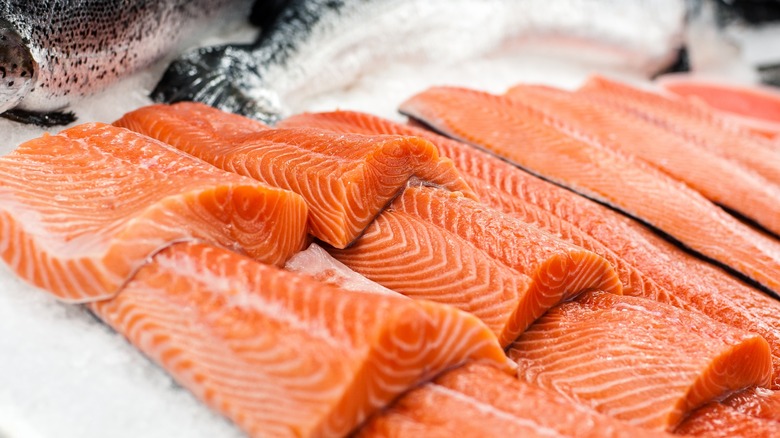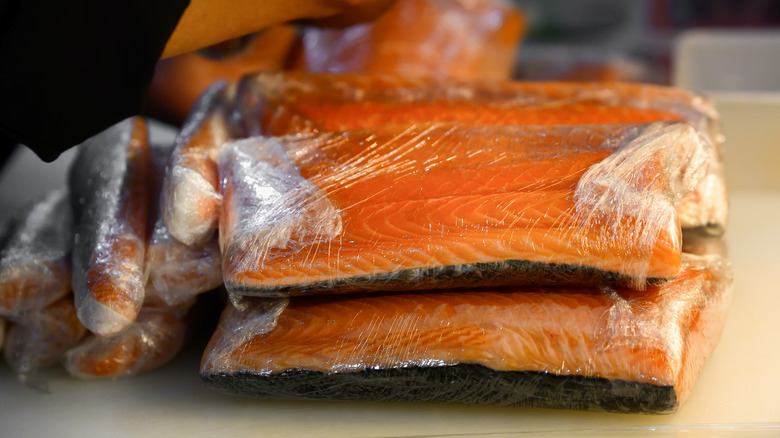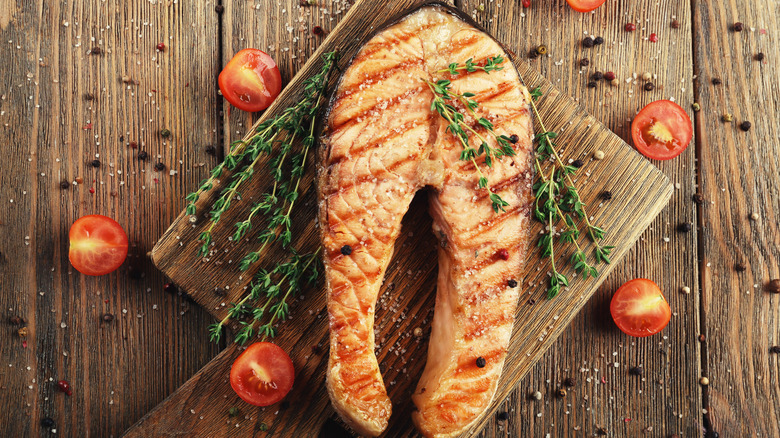The Absolute Best Way To Freeze Salmon
With its distinct, rich flavor, salmon can turn any meal into a gourmet experience. You can bake, grill, fry, or poach it, eat it smoked, or cure it in sea salt, sugar, and spices. But first, it's important to store it properly for maximum freshness. Generally, salmon lasts one to two days in the fridge or up to three months in the freezer.
Contrary to popular belief, frozen salmon is just as good as its fresh counterpart. According to the University of Alaska Fairbanks, not only does freezing inhibit bacterial growth and prevent spoilage, but it also preserves fish quality. Researchers recommend vacuum sealing the fish before freezing it, but if that's not an option, you can double-wrap it in plastic wrap and store it in a freezer-safe ziplock. The double layers of plastic film create a seal that keeps moisture inside and prevents freezer burn. At the same time, they protect against oxidation, resulting in a longer shelf life.
How to freeze salmon for maximum freshness
Whether you buy fresh or frozen salmon, it's crucial to keep it cold until you can freeze it yourself. Ideally, use an insulated bag to carry it home. Note that fresh whole salmon should have a firm texture, shiny scales, reddish gills, and bright, clear eyes. If you buy it frozen, make sure the plastic covering is intact. Check the fish for ice crystals, dried patches, and bruises. When you get home, gut the salmon (if it's whole) and then cut it into steaks or filets.
Wrap each piece individually in plastic, then apply a second layer of plastic, squeezing out the excess air with each layer. After that, you can add an extra layer of butcher paper or aluminum foil, or just put the fish in freezer bags, and label the date of freezing. Store the salmon at or below zero degrees Fahrenheit. Generally, it's best to consume it within three months, but you can store it for up to eight or nine months (though it may suffer changes in texture and flavor).
Some chefs pretreat the fish before freezing it to preserve its flavor and prevent rancidity. This process involves dipping the salmon in a mixture of ascorbic acid, or vitamin C, and cold water for 20 seconds. After that, dry it and wrap it as described above. Make sure you also avoid common mistakes when freezing fish like freezing it too slowly or wrapping it too loosely.
The proper way to freeze cooked salmon
Cooked fish lasts for three to four days in the refrigerator and up to two months in the freezer. While it's possible to freeze cooked salmon, you may notice changes in its color, flavor, and texture after thawing it. For example, it may turn grayish or flake apart. However, the result depends on how the fish was cooked, frozen, and thawed.
If you go this route, let the cooked salmon cool completely, and remove it from the sauce and other ingredients. Portion it out, and then wrap each piece in parchment paper to prevent moisture loss. Place the portions into freezer-safe bags, removing as much air as you can. Store the fish on top of other foods in the freezer to prevent it from being squeezed. Alternatively, transfer the wrapped salmon to an airtight container before freezing it.
When you're ready to use it, let it thaw in the fridge for a few hours or overnight. Or you can microwave it for a few minutes — though it may dry out. Once thawed, reheat it in a pan and eat it right away, or add it to salads, wraps, fish burgers, quesadillas, tacos, or pasta dishes. You can also try TikTok's viral salmon rice bowl, which is just perfect for a quick, filling lunch or dinner.


